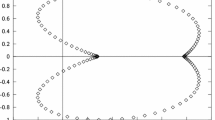Abstract
The numerical solution of a 1D fractional Laplacian boundary value problem is studied. Although the fractional Laplacian is one of the most important and prominent nonlocal operators, its numerical analysis is challenging, partly because the problem’s solution has in general a weak singularity at the boundary of the domain. To solve the problem numerically, we use piecewise linear collocation on a mesh that is graded to handle the boundary singularity. A rigorous analysis yields a bound on the maximum nodal error which shows how the order of convergence of the method depends on the grading of the mesh; hence, one can determine the optimal mesh grading. Numerical results are presented that confirm the sharpness of the error analysis.
Similar content being viewed by others
References
Acosta, G., Borthagaray, J.P.: A fractional Laplace equation: regularity of solutions and finite element approximations. SIAM J. Numer. Anal. 55(2), 472–495 (2017). https://doi.org/10.1137/15M1033952
Acosta, G., Borthagaray, J.P., Bruno, O., Maas, M.: Regularity theory and high order numerical methods for the (1D)-fractional Laplacian. Math. Comp. 87(312), 1821–1857 (2018). https://doi.org/10.1090/mcom/3276
Andreu-Vaillo, F., Mazón, J.M., Rossi, J.D., Toledo-Melero, J.J.: Nonlocal diffusion problems, Mathematical Surveys and Monographs, vol. 165. American Mathematical Society, Providence, RI; Real Sociedad Matemática Española, Madrid (2010). https://doi.org/10.1090/surv/165
Bertoin, J.: Lévy processes, Cambridge Tracts in Mathematics, vol. 121. Cambridge University Press, Cambridge (1996)
Borthagaray, J.P., Leykekhman, D., Nochetto, R.H.: Local energy estimates for the fractional Laplacian. SIAM J. Numer. Anal. 59(4), 1918–1947 (2021). https://doi.org/10.1137/20M1335509
Borthagaray, J.P., Nochetto, R.H.: Constructive approximation on graded meshes for the integral fractional Laplacian. Constr. Approx. 57(2), 463–487 (2023). https://doi.org/10.1007/s00365-023-09617-5
Chen, H., Sheng, C., Wang, L.L.: On explicit form of the FEM stiffness matrix for the integral fractional Laplacian on non-uniform meshes. Appl. Math. Lett. 113, Paper No. 106864, 8 (2021). https://doi.org/10.1016/j.aml.2020.106864
Chen, M., Deng, W.: Fourth order accurate scheme for the space fractional diffusion equations. SIAM J. Numer. Anal. 52(3), 1418–1438 (2014). https://doi.org/10.1137/130933447
Chen, M., Qi, W., Shi, J., Wu, J.: A sharp error estimate of piecewise polynomial collocation for nonlocal problems with weakly singular kernels. IMA J. Numer. Anal. 41(4), 3145–3174 (2021). https://doi.org/10.1093/imanum/draa054
D’Elia, M., Gunzburger, M.: The fractional Laplacian operator on bounded domains as a special case of the nonlocal diffusion operator. Comput. Math. Appl. 66(7), 1245–1260 (2013). https://doi.org/10.1016/j.camwa.2013.07.022
Duo, S., van Wyk, H.W., Zhang, Y.: A novel and accurate finite difference method for the fractional Laplacian and the fractional Poisson problem. J. Comput. Phys. 355, 233–252 (2018). https://doi.org/10.1016/j.jcp.2017.11.011
Faustmann, M., Karkulik, M., Melenk, J.M.: Local convergence of the FEM for the integral fractional Laplacian. SIAM J. Numer. Anal. 60(3), 1055–1082 (2022). https://doi.org/10.1137/20M1343853
Faustmann, M., Marcati, C., Melenk, J.M., Schwab, C.: Exponential convergence of hp-FEM for the integral fractional Laplacian in 1D (2022)
Faustmann, M., Marcati, C., Melenk, J.M., Schwab, C.: Exponential convergence of hp FEM for the integral fractional Laplacian in polygons (2022)
Faustmann, M., Melenk, J.M., Praetorius, D.: Quasi-optimal convergence rate for an adaptive method for the integral fractional Laplacian. Math. Comp. 90(330), 1557–1587 (2021). https://doi.org/10.1090/mcom/3603
Getoor, R.K.: First passage times for symmetric stable processes in space. Trans. Amer. Math. Soc. 101, 75–90 (1961). https://doi.org/10.2307/1993412
Han, R., Wu, S.: A monotone discretization for integral fractional Laplacian on bounded Lipschitz domains: pointwise error estimates under Hölder regularity. SIAM J. Numer. Anal. 60(6), 3052–3077 (2022). https://doi.org/10.1137/21M1448239
Huang, Y., Oberman, A.: Numerical methods for the fractional Laplacian: a finite difference-quadrature approach. SIAM J. Numer. Anal. 52(6), 3056–3084 (2014). https://doi.org/10.1137/140954040
Kwaśnicki, M.: Ten equivalent definitions of the fractional Laplace operator. Fract. Calc. Appl. Anal. 20(1), 7–51 (2017). https://doi.org/10.1515/fca-2017-0002
Ros-Oton, X., Serra, J.: The Dirichlet problem for the fractional Laplacian: regularity up to the boundary. J. Math. Pures Appl. 101(3), 275–302 (2014). https://doi.org/10.1016/j.matpur.2013.06.003
Stynes, M., O’Riordan, E., Gracia, J.L.: Error analysis of a finite difference method on graded meshes for a time-fractional diffusion equation. SIAM J. Numer. Anal. 55(2), 1057–1079 (2017). https://doi.org/10.1137/16M1082329
Zhang, X., Gunzburger, M., Ju, L.: Nodal-type collocation methods for hypersingular integral equations and nonlocal diffusion problems. Comput. Methods Appl. Mech. Engrg. 299, 401–420 (2016). https://doi.org/10.1016/j.cma.2015.11.008
Funding
The work of the first author was supported by the Science Fund for Distinguished Young Scholars of Gansu Province under Grant No. 23JRRA1020 and the Fundamental Research Funds for the Central Universities under grant lzujbky-2023-06. This work was supported by the National Natural Science Foundation of China under Grant Nos. 12225107 and 12071195, and the Innovative Groups of Basic Research in Gansu Province under Grant No. 22JR5RA391. The work of Martin Stynes is supported in part by the National Natural Science Foundation of China under grants 12171025 and NSAF-U2230402.
Author information
Authors and Affiliations
Corresponding author
Ethics declarations
Conflict of interest
The authors declare no competing interests.
Additional information
Communicated by: Bangti Jin
Publisher's Note
Springer Nature remains neutral with regard to jurisdictional claims in published maps and institutional affiliations.
Rights and permissions
Springer Nature or its licensor (e.g. a society or other partner) holds exclusive rights to this article under a publishing agreement with the author(s) or other rightsholder(s); author self-archiving of the accepted manuscript version of this article is solely governed by the terms of such publishing agreement and applicable law.
About this article
Cite this article
Chen, M., Deng, W., Min, C. et al. Error analysis of a collocation method on graded meshes for a fractional Laplacian problem. Adv Comput Math 50, 49 (2024). https://doi.org/10.1007/s10444-024-10146-3
Received:
Accepted:
Published:
DOI: https://doi.org/10.1007/s10444-024-10146-3



